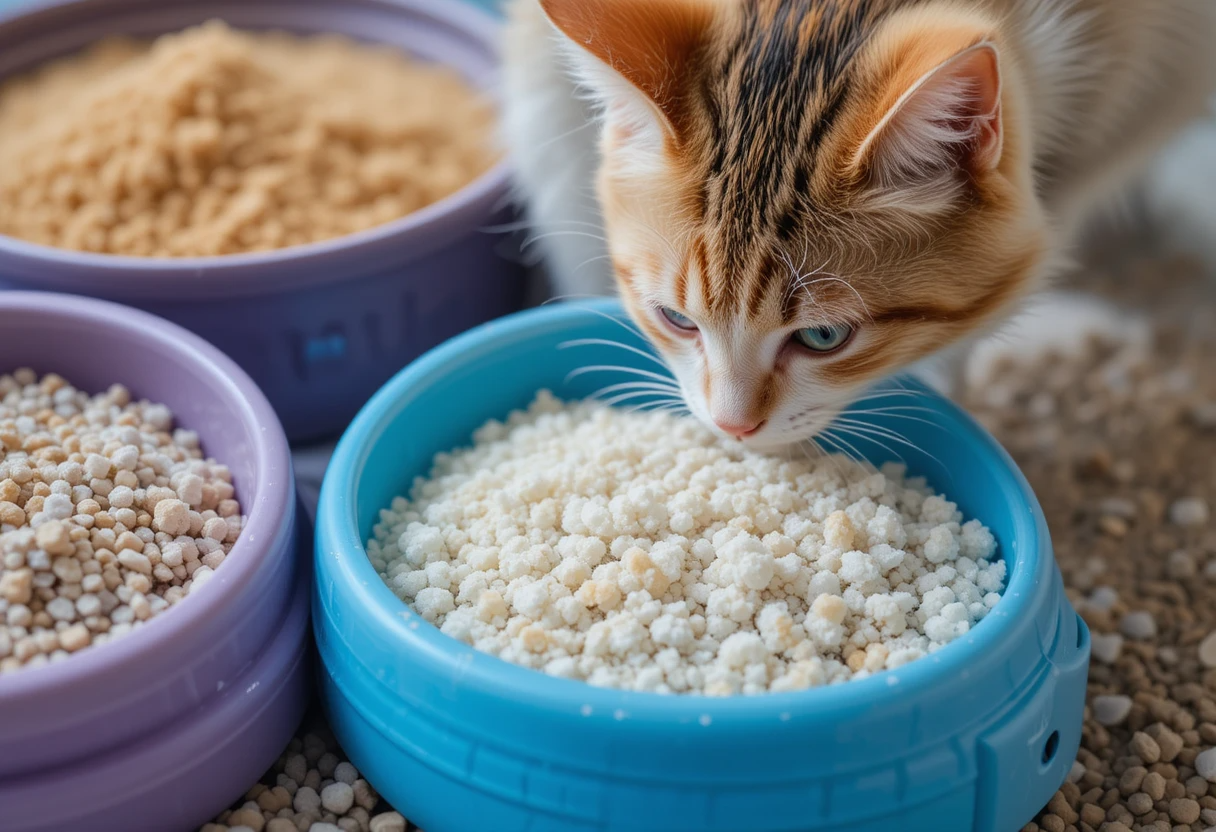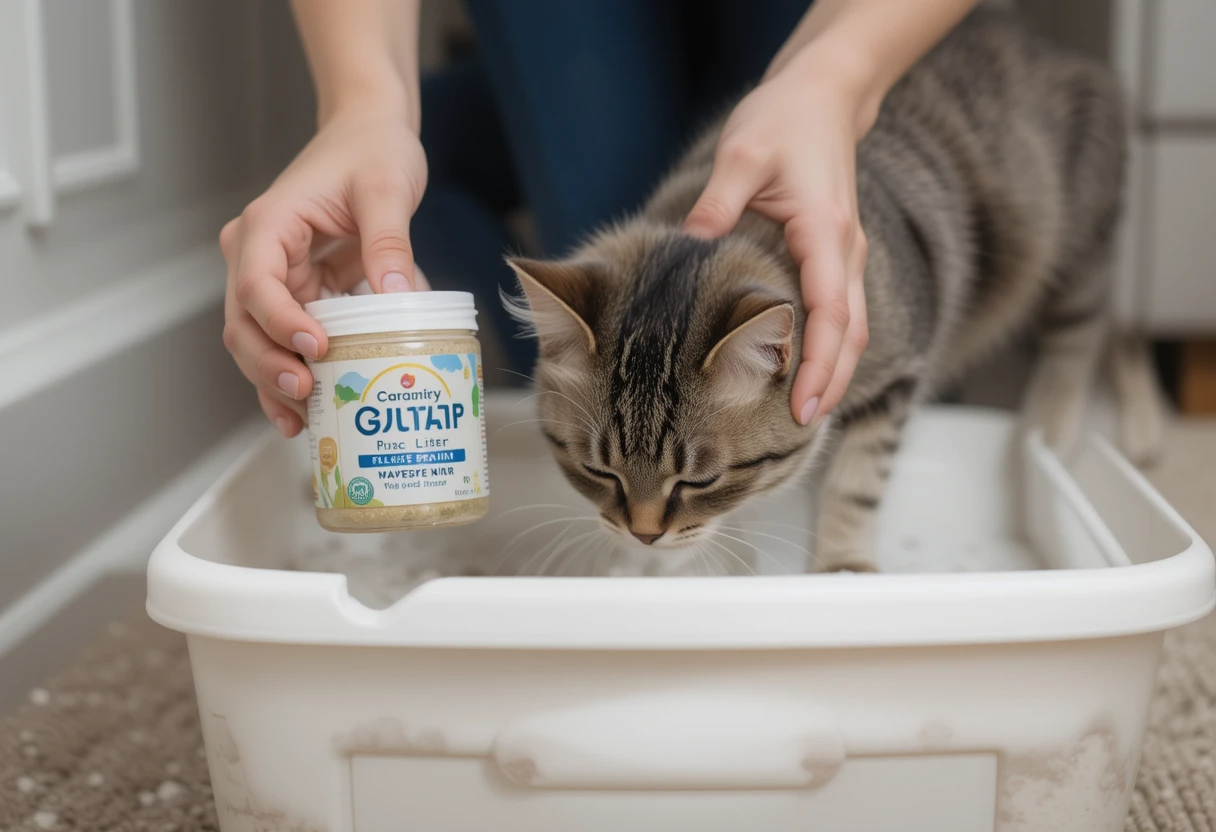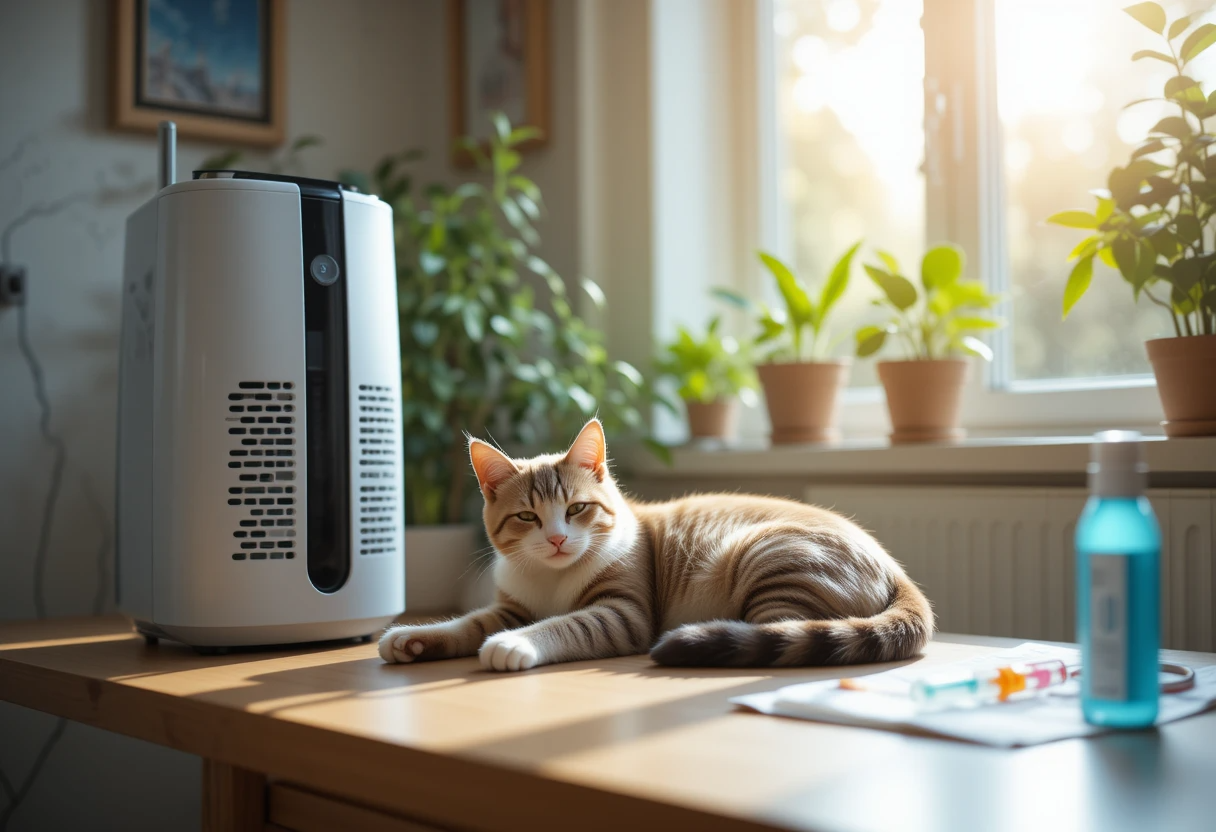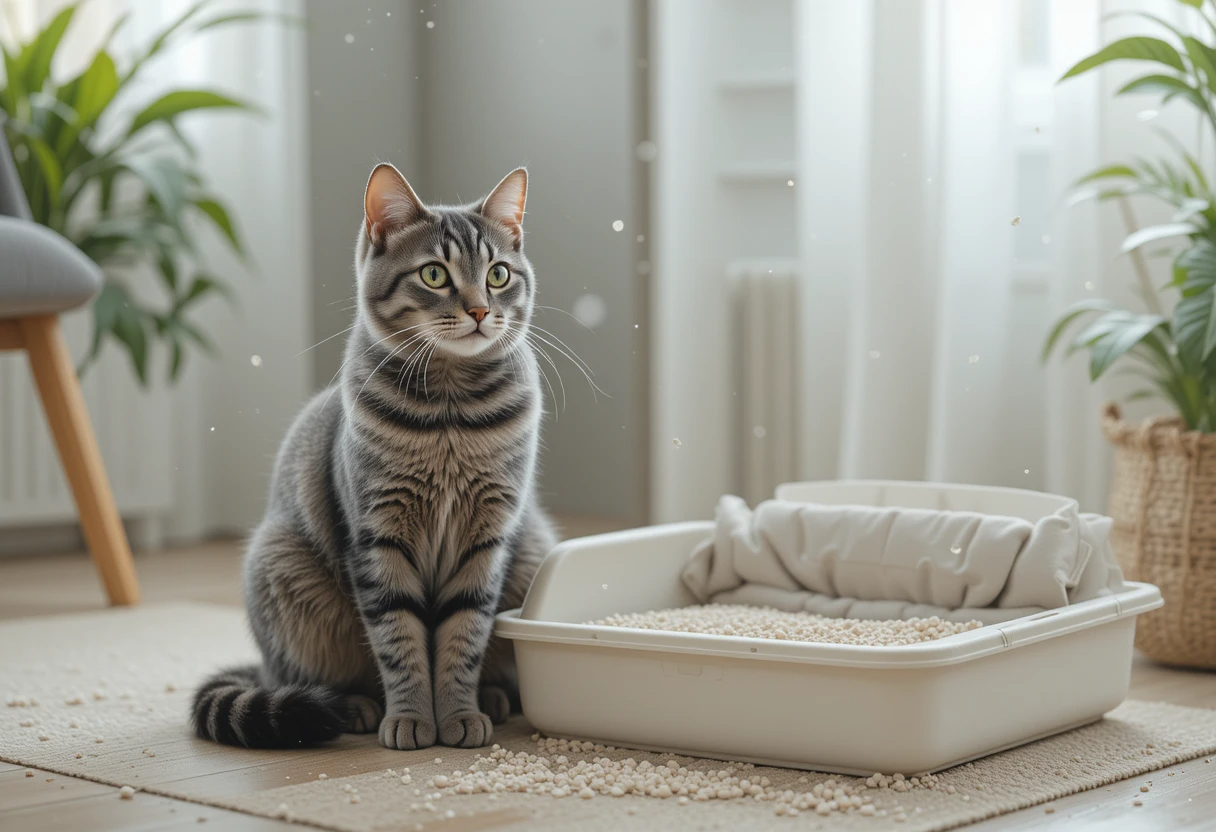Cats with asthma require special consideration when it comes to their litter boxes. The wrong type of cat litter can trigger asthma attacks and worsen respiratory conditions, while the right choice can help manage symptoms and improve your cat’s quality of life.
In this comprehensive guide, we’ll explore the best litter options for asthmatic cats, the science behind cat asthma, and practical tips for creating a healthier environment for your feline friend.
Understanding Feline Asthma
Feline asthma is a breathing problem that affects many cats. It causes coughing, wheezing, and shortness of breath due to inflamed airways. If your cat has asthma, choosing the best litter for cats with asthma is important to avoid triggering attacks and keep them comfortable.
What is Cat Asthma?
Feline asthma is a chronic inflammatory respiratory condition affecting approximately 1% to 5% of the domestic cat population. Similar to human asthma, it involves the narrowing and inflammation of airways in the lungs, making breathing difficult and causing recurring respiratory distress.
“Feline asthma is caused by an allergic reaction triggered when the cat inhales an allergen such as dust, cigarette smoke, pollens, dust mites, or even dust from cat litter,” explains PetMD. This condition occurs when a cat’s immune system overreacts to the presence of an allergen and releases stimulants that cause inflammation and constriction of the airways.
Common Symptoms of Cat Asthma
Recognizing the signs of feline asthma is crucial for early intervention. Look for these symptoms:
- Persistent coughing or hacking
- Wheezing, especially during exhalation
- Rapid breathing or difficulty breathing
- Open-mouth breathing (particularly concerning)
- Lethargy or reduced activity
- Blue lips and gums (in severe cases)
- Hunched posture with neck extended
- Frothy mucus from nose or mouth
How Cat Litter Affects Asthmatic Cats
Cat litter plays a significant role in triggering asthma attacks. “Litter can affect your cat because the dust from typical clay and other dusty litters can lead to irritation of the airway, triggering an asthma attack,” notes Preventive Vet. When cats dig in their litter box, dust particles become airborne and can be inhaled, potentially causing inflammation and bronchial constriction.
Best Types of Cat Litter for Cats with Asthma

When your cat has asthma, picking the right litter matters a lot. The best litter for cats with asthma is low-dust, fragrance-free, and gentle on sensitive lungs. Some top choices include paper-based, crystal, or dust-free clay litters that help reduce breathing problems and keep your cat safe.
1. Clay-Based Low-Dust Options
While traditional clay litter is typically dusty and not recommended for asthmatic cats, some specially formulated clay options are designed to be virtually dust-free.
Dr. Elsey’s Respiratory Relief Clumping Clay Cat Litter
Dr. Elsey’s Respiratory Relief is specifically designed for cats with respiratory issues. It’s a low-dust, hypoallergenic litter with no added plant proteins, perfumes, or deodorants.
Key Benefits:
- Specially formulated for cats with breathing problems
- Hypoallergenic with minimal dust
- Free from perfumes and artificial additives
- Strong clumping action for easy cleaning
- Effective odor control
User Experience: “One of my cats has kitty asthma and this litter has been fantastic. She loves it and I believe her asthma attacks have lessened in intensity and number of attacks,” shares one user on the official Dr. Elsey’s website.
Arm & Hammer Cloud Control Platinum Litter
This litter aims to provide a dust-free experience with the added benefit of odor control.
Key Benefits:
- Advertised as 100% dust-free
- Features Dander Shield Technology
- Hypoallergenic light scent
- Hard clumping for easy cleaning
User Experience: According to The Catnip Times review: “This litter has it all – it’s 100% dust-free, has a hypoallergenic light scent, and offers fast and firm clumping action.” However, some users report that clumps can break apart easily when scooping.
2. Crystal Litter Options
Crystal cat litters made from silica gel can be excellent for cats with asthma due to their extremely low dust production.
PetSafe ScoopFree Premium Crystal Cat Litter
This crystal litter absorbs moisture and dries out solid waste rather than forming clumps.
Key Benefits:
- Almost completely dust-free
- Excellent odor control
- Highly absorbent
- Lightweight
- Non-tracking
User Experience: “It absorbs urine well and dries out the solids. I just have one cat, so I scoop the solids every couple of days and do a complete litter change every few weeks,” reports one Amazon reviewer. However, crystal litters require complete replacement more frequently than clumping options.
Pretty Litter
Pretty Litter is a color-changing crystal litter that can help monitor your cat’s health while providing a low-dust environment.
Key Benefits:
- Made from amorphous silica gel (non-toxic)
- Changes color to indicate potential health issues
- Highly absorbent
- Low dust and minimal tracking
User Experience: While many users appreciate the health monitoring features, opinions on dust levels vary. Some users report it works well for asthmatic cats, while others have noted respiratory irritation. “Crystal litter provides an added benefit by significantly reducing the production of silica dust, making it an ideal option for cat owners with allergies. It can also even prevent cats from developing asthma, and is certainly easier on the lungs of those animals who already have asthma,” according to Pretty Litter’s blog.
3. Paper-Based Litter
Paper litter is often recommended for cats with respiratory issues due to its naturally low dust production.
Okocat Dust Free Non-Clumping Paper Pellet Cat Litter
This litter is made from recycled paper formed into pellets, providing a dust-free alternative to traditional litter types.
Key Benefits:
- Made from clean, white paper pellets
- Free from inks, dyes, and scents
- Specifically marketed as dust-free
- Ideal for cats with respiratory ailments
- Biodegradable and environmentally friendly
User Experience: “Excellent light-weight litter, really dust-free and with great odor control. It’s great when I travel with my cat because it is so light-weight and absorbent,” says one Amazon reviewer. However, some users note that the pellets can be harder to scoop and may not control odors as effectively as other types.
4. Natural Alternative Litters
Several natural materials make excellent low-dust alternatives to traditional clay litter.
Naturally Fresh Walnut Shell Cat Litter
Made from crushed walnut shells, this natural option is biodegradable and generally produces less dust than clay.
Key Benefits:
- Made from all-natural walnut shells
- Low dust production
- Biodegradable and eco-friendly
- Good odor absorption
- Available in clumping and pellet formulations
User Experience: “The most impressive thing about the walnut litter is how well it absorbs urine smell. Cleaning the boxes is WAY less smelly now, and the dust is, actually, way less than traditional clay litter,” shares a YouTube reviewer. Some users note it may track more than other options.
Wood Pellet Litter
Wood pellet litters, often made from pine or other kiln-dried woods, can be excellent for cats with asthma.
Key Benefits:
- Very low dust
- Natural pine scent helps control odors
- Economical and eco-friendly
- Biodegradable
- Can be compostable (solid waste removed)
User Experience: “They are much better for asthmatic cats than clay litter unless your cat has a pine allergy. Use caution when trying it out,” advises a Quora user. It’s worth noting that some cats may need time to adjust to the different texture of wood pellets.
How to Choose the Right Litter for Your Asthmatic Cat

Choosing the best litter for cats with asthma isn’t just about low dust—your cat’s comfort matters too! Pay attention to texture, scent, and how easily your cat accepts the new litter. Always transition slowly and try offering a few litter types to find the one your furry friend prefers most.
Consider Your Cat’s Preferences
Cats can be particular about their litter box. When switching to a new litter, consider:
- Texture: Some cats prefer fine-grained litter while others may adapt better to pellets or crystals
- Transition gradually: Mix new litter with the old, gradually increasing the proportion of new litter
- Multiple boxes: If possible, offer different litter options to see which your cat prefers
Important Features to Look For
When selecting litter for asthmatic cats, prioritize:
- Dust-free or low-dust formulation: This is the most critical feature
- Unscented or naturally scented: Artificial fragrances can irritate sensitive airways
- Hypoallergenic properties: Free from additives that might trigger allergies
- Clumping vs. non-clumping: Both can work, depending on your cat’s preferences
- Tracking reduction: Less tracking means fewer particles becoming airborne
Cost Considerations
Specialty litters designed for cats with respiratory issues often come with a higher price tag. However, the investment is worthwhile considering:
- Long-term health benefits: Reduced veterinary visits and medication needs
- Longevity: Some premium litters last longer than budget options
- Medical costs: Treating asthma attacks can be expensive, with emergency care costing $800-$1,500 per episode
Managing Your Cat’s Environment Beyond Litter

Using the best litter for cats with asthma is just the start. To truly help your cat breathe easy, keep the home clean, dust-free, and smoke-free. Regular vet visits, air purifiers, and avoiding strong scents can all make a big difference in managing your cat’s asthma long-term.
Comprehensive Asthma Management
Choosing the right litter is just one aspect of caring for a cat with asthma. A holistic approach includes:
1. Regular veterinary care: Follow your vet’s treatment plan, which may include:
- Corticosteroids to reduce inflammation
- Bronchodilators to open airways
- Possibly inhaled medications using specialized cat inhalers
2. Environmental modifications:
- Use HEPA air purifiers in your home
- Avoid smoking indoors
- Minimize use of aerosols, perfumes, and harsh cleaning chemicals
- Reduce exposure to dust, pollen, and other allergens
3. Litter box management:
- Place litter boxes in well-ventilated areas
- Clean frequently to reduce ammonia buildup
- Consider covered boxes with good ventilation to contain dust
Monitoring Your Cat’s Condition
Keep track of your cat’s respiratory health by:
- Observing breathing patterns: Normal resting respiratory rate should be 24-30 breaths per minute
- Noting symptom triggers: Keep a journal of when symptoms appear and possible causes
- Watching for emergency signs: Open-mouth breathing, blue gums, or extreme lethargy require immediate veterinary attention
Curious about how to safely handle your Ragdoll cat? Read More:- Safety Tips for Handling Your Ragdoll Cat
FAQs
What is the best cat litter for cats with asthma and allergies?
The best litter for cats with asthma is typically dust-free and unscented. Top recommendations include Dr. Elsey’s Respiratory Relief, Okocat Dust Free Paper Pellet Litter, and natural options like wood pellets or walnut-based litters. The ideal choice depends on your cat’s specific sensitivities and preferences.
What is a dust-free litter for cats with asthma?
Truly dust-free options include paper-based litters like Okocat Dust Free Paper Pellet Litter, crystal litters like PetSafe ScoopFree Premium Crystal Cat Litter, and specially formulated clay litters like Dr. Elsey’s Respiratory Relief, which is designed specifically for cats with respiratory issues.
What cat litter produces the least amount of dust?
Crystal/silica gel litters typically produce the least dust, followed by paper pellets, wood pellets, and walnut shell litters. Among clay litters, those specifically marketed as dust-free, like Arm & Hammer Cloud Control, tend to perform better than standard clay options.
Can dusty litter cause asthma in cats?
Yes, dusty litter can trigger asthma attacks in cats predisposed to the condition and may worsen symptoms in cats already diagnosed with asthma. According to Cornell University’s Feline Health Center, “While specific asthma-causing agents typically remain unidentified, suspected allergens include tobacco smoke, dusty kitty litter, vapors from household cleaning solutions and aerosol sprays, pollen, mold, and mildew.”
Is crystal litter better for cats with asthma?
Crystal litter can be an excellent choice for cats with asthma as it typically produces significantly less dust than clay alternatives. According to PrettyLitter, “Crystal litter provides an added benefit by significantly reducing the production of silica dust, making it an ideal option for cat owners with allergies. It can also even prevent cats from developing asthma, and is certainly easier on the lungs of those animals who already have asthma.”
Conclusion
Selecting the right litter for a cat with asthma is a crucial component of managing their condition and ensuring their comfort. While dust-free options like crystal litters, paper pellets, and specialized clay formulations like Dr. Elsey’s Respiratory Relief tend to be the best choices, the ultimate decision should consider your cat’s preferences, your budget, and your specific household situation.
Remember that managing feline asthma requires a multi-faceted approach that goes beyond just litter selection. Regular veterinary care, medication as prescribed, and environmental modifications all play important roles in keeping your asthmatic cat healthy and comfortable.
By making informed choices about your cat’s litter and overall environment, you can significantly reduce asthma triggers and help your feline friend breathe easier, leading to a happier, healthier life together.
Want to learn natural ways to treat your dog’s ear infection? Read More:- About Natural Remedies for Dog Ear Infection Without a Vet

